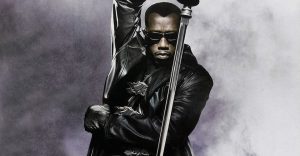Cobra Kai: Why Daniel’s Karate Kid Crane Kick Was Illegal
The sequel series Cobra Kai renews the rivalry between Karate Kid characters Johnny Lawrence and Daniel LaRusso, with the former lamenting multiple times that the latter’s iconic crane kick in the original movie was an illegal move. Johnny isn’t just a sore loser, however, and multiple people agree — in fact, Barney made a similar argument on How I Met Your Mother. Is there a basis to this claim?
Cobra Kai follows the lives of Johnny and Daniel 30-odd years after the events of the beloved ’80s movie, and it’s clear from the season 1 premiere that Johnny isn’t over his humiliating defeat at the All Valley Under 18 Karate Championship in the first Karate Kid movie. Like many former jocks unable to move on from their glory days, Johnny clearly feels that his best years are behind him. Thankfully, the first season sees him gradually gain some stability in his life, thanks in no small part to picking up the young mentee and karate student Miguel.
Although it appears that Daniel and Johnny haven’t seen themselves for years when Cobra Kai begins, a number of chance events leads to them encountering each other as adults. Johnny is at an all-time low when he finds himself face-to-face with his former rival in the series premiere, and it makes sense for his character to have held a grudge about the crane kick — which to him, arguably, changed the whole trajectory of his life (and based on Danny’s karate-themed marketing for his car dealership, perhaps his life too). While he comes across as a sour-puss — and Johnny does indeed hate Daniel disproportionately to what happened — the former Cobra Kai student does also have a point: based on the tournament rules stated in the movies, as well as common rules for youth karate tournaments in real life, the match-winning move was indeed an illegal strike. This begs the question: why was Daniel awarded the win?
Click here to watch 15 Plot Holes You Missed In Your Favorite Action Movies on YouTube
Why Daniel’s Crane Kick in Karate Kid Was Illegal

The crane kick in Karate Kid was an illegal move for two primary reasons. The first is the most-often referenced in debates on whether Daniel cheated in Karate Kid: the fact that Daniel struck Johnny in the face. The referee in the movie lists strikes to the face as not permissible; while this doesn’t mean that Daniel should have been disqualified, it does mean that he should not have been awarded a point for the strike (which he was). Even actor Ralph Macchio, who plays Daniel in the original trilogy and the sequel series, believes that the movie went against the rules, telling The Wrap, “No hits to the face was clearly something when the referee made the list of things what not to do.”
Part of the problem interpreting the rules within the movie is that they seem inconsistent. Looking at rules in real-life karate tournaments can shed some light on the issue. Based on the rules published by the USA National Karate-do Federation, it does seem that the move was illegal — but not because Johnny was hit in the face. Strikes to the face and front kicks are actually permitted according to these rules, as long as the strike isn’t open palm. Because the tournament is an under 18, the only contact to the face allowed is a “jodan” kick with “skin touch” level of contact; in other words, the competitor is only allowed to make light contact rather than land a physical blow. These tournaments are not UFC matches — the aim is not to injure your opponent. In addition to Daniel’s crane kick being a fictional move, it also was a full extension blow that dazed his opponent. According to the official USA-NKF rules, Daniel should have been given a warning or even a penalty.
Why It Doesn’t Matter That The Crane Kick Was Illegal

Ultimately, it doesn’t matter if Daniel’s crane kick in The Karate Kid defied real life rules — because so many of the events in the movie’s climactic fight scene also go against official rules. In addition to the general sportsmanship requirements that would have cost Cobra Kai significant points for their behavior (the rules award points for things like “sporting attitude” and “good form“), the rules also explicitly forbid attacks targeting joints. The repeat strikes by Cobra Kai competitors to Daniel’s knee in particular would have resulted in warnings, penalties, and, eventually, disqualification.
Furthermore, it is highly unlikely that Daniel would have been allowed to compete while he was so visibly injured. There are provisions in the rules for injuries, including the requirement of an assessment to determine if each competitor is fit to fight. This includes provisions specifically for injuries resulting from “cumulative effect of injury sustained in an earlier bout.” Despite Mr. Miyagi’s healing reiki touch, Daniel was still injured from the previous rounds — something the judges and referees had just witnessed.
Why Daniel Won The All Valley Championship

From a narrative perspective, it makes sense for the crane kick to be Daniel’s finishing move. The technique is a Mr. Miyagi specialty, and thus, the young student mastering it in such a climactic way represents Daniel’s journey as a student. Because the technique is specific to Miyagi-do karate, there is the additional symbolic meaning too: that the gentle ethical training of Miyagi-do is superior to John Kreese’s “no mercy” teachings at Cobra Kai. Even within the Karate Kid world, the win makes sense. Eschewing the real-life rules, one could still argue that the movies establish that strikes to the face are not permitted; however, given how unsportsmanlike the Cobra Kai conduct had been, it’s completely believable that the judges and referees would ignore Daniel’s one violation and award the trophy to the most deserving competitor. Ultimately, Johnny got what he deserved.
Cobra Kai has at least dealt with the problems with Daniel’s win, and the sequel series dares to challenge audiences regarding the franchise’s glorification of violence. Season 2 ends with a dojo war with far more tragic consequences than anything that happened in the beloved ’80s movies. That said, the original movie had a very different kind of message in mind for its viewers: an underdog story that inspired viewers to stand up to their fears and overcome them. In an interesting metafictional turn, the chief referee in The Karate Kid was played by Pat E. Johnson, who actually formulated the penalty point system used for American karate tournaments [via Martial Arts Action & Entertainment]. Johnson was involved in all of the film’s fight choreography, and would have been acutely aware of what was and was not allowed in such a tournament. If Johnson was alright with Daniel besting Johnny with a crane kick to the face in The Karate Kid, then perhaps audiences should be too.
About The Author


















